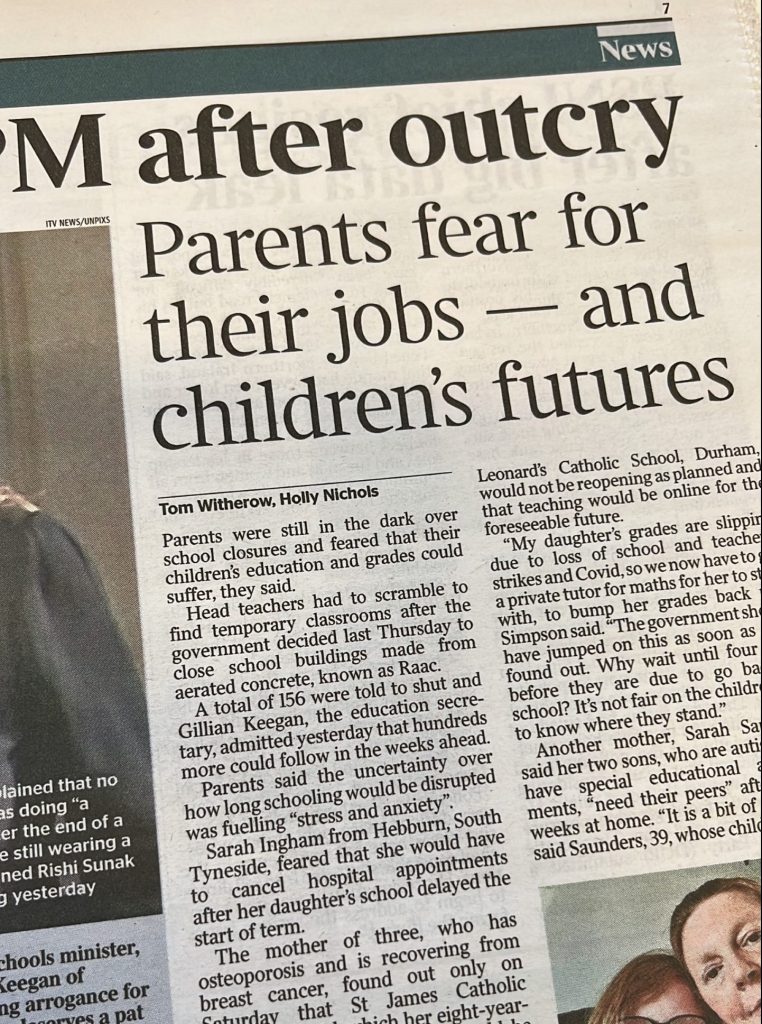We offer each of our trainees a summer bursary of up to £1,000 every summer of their degree to spend on journalism work experience or a journalism project, giving them the unique opportunity to travel and explore the areas of journalism they are passionate about.
Here, School of Journalism trainee Holly Nichols shares how she spent a week working at The Times.
This summer I was able to spend one week working at The Times newspaper in London. I spent my time shadowing journalists, assisting investigations and writing news copy – all while building connections and learning invaluable skills.
On my first day I got stuck into work straight away by helping to find case studies for the schools affected by Reinforced Autoclaved Aerated Concrete (RAAC). After a couple of hours of scouring through social media pages and reaching out to parents affected by the issue from all over the country, I started receiving responses. By the late afternoon I had had multiple phone calls with several upset mothers who couldn’t send their children to school.
My shorthand came in handy when it came to making notes about their experience over the phone. I then wrote up and compiled their experiences into case studies which were then included in the RAAC coverage in the next day’s edition of The Times!

Holly’s byline!
On Wednesday I was asked to accompany a journalist who was travelling to Kent to track small boats arriving in Dungeness and interview the migrants disembarking in the UK. Several boats were expected to arrive as it was the right temperature and conditions. However, when we arrived we were told that no boats would be coming in that day. So instead we headed down to the local migrant holding centre where we were able to interview migrants in a park outside the facility. We spoke to several men about their lives and their experiences of entering the UK.
This was such an eye-opening experience which allowed me to gain perspective on these individuals’ lives and why they would choose to travel to the UK from their respective countries. Their stories were then compiled and published on page 8 of The Times the following day.
This was a great lesson in resilience as, once we were told there would be no boats arriving that day, we could have turned around and headed back to London, instead we stayed in the local area and managed to find a story just by talking to people.
In addition to the trip to Kent, I also attended a press event on my own as a journalist from The Times, where I was able to interview former British astronaut Tim Peake. When I was first asked to go alone, I was so nervous I wouldn’t ask the right questions and I would make an idiot of myself. I got to the event way too early and did way too much research for the amount of time I had to ask questions, but being over-prepared helped with the nerves and when I came out of the event I was buzzing.
The quotes from Peake were then used alongside an article in the paper the following day, and I wrote an article based on the most ‘newsworthy’ quote – which was about humans reaching Mars by the 2030s. This article was also published in the paper and on the website.
My final day in the office was the first anniversary of the death of Queen Elizabeth II. I was asked to visit Buckingham Palace and interview members of the public paying their respects to the late Queen. This was a great experience as, although it was initially difficult to find people who were visiting specifically to pay their respects, I eventually found several groups of people who were really happy to speak with me. I was able to write up their stories to be compiled for an article in the paper the following day.
The whole experience was incredibly fast-paced and challenging but I feel I was able to harness those challenges to improve both my journalistic skill set and my self-confidence in the field.
This experience would not have been possible without summer bursary! I am extremely grateful I was able to gain new skills and make new contacts.
You can read more summer bursary blogs here.
Click here to join our free taster events to experience what it’s like to be a journalist and study on our BA (Hons) Multimedia Journalism degree.

